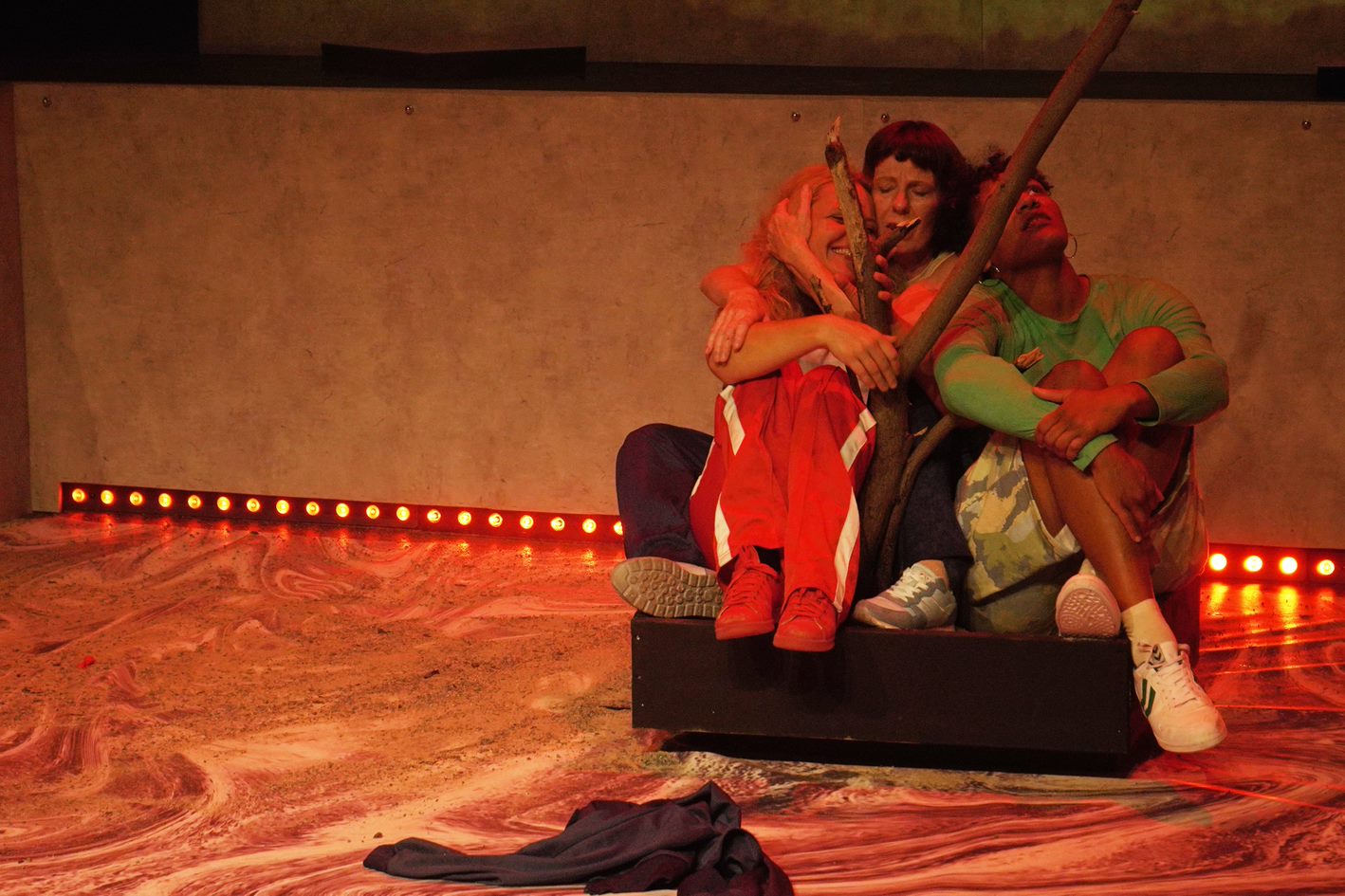


Which memories come to mind and which ones are repressed? Which stories are told and most importantly, which stories manage to be passed on? Against an apocalyptic backdrop, the focus is on the memories of three women. The theater performance Das verkommene Land („The Decayed Land") asks, whose stories endure and who makes these decisions.



The world is burning. Three women seek refuge on the shore of a lake, when a boat with two seats is washed ashore. While Medea negotiates with Noah about whether and how humanity can be saved from the apocalypse, fragments of memories are also washed ashore. And above all, the question looms: whose stories have a place on the boat?
Das Patriarchat, wird geflutet. Es gibt ein Schiff. Da kommen die drauf, die die neue Welt schaffen sollen.
(Auszug „Das Verkommene Land“; "It's the patriarchy, flooded. There's a ship. That's where those who will create the new world will come.")
It's about memories; memories of three women and the question of why some memories are heard and others are not. The starting point was interviews with all those involved.
Staging
This 90-minute theater piece unfolds on three distinct spatial levels: a Robinson Crusoe-like beach setting, aesthetic choral formations, and a direct, almost intimate level with three actresses directly in front of the audience. Initially, these levels are sharply separated, but gradually blend and dissolve completely by the end.
On these three levels, three stories unfold:
- Medea confronts Noah with who he would save on the ark, questioning his privileged perspective and the value of those chosen for salvation. She challenges the potential of a world without patriarchy and privileges, pushing Noah, who is trapped in his patriarchal thought patterns and struggling to find an answer.
- Three actresses reflect on their different experiences as women and as female performers. They recognize that age, sexual orientation, gender, and appearance create diverse life stories.
- With no way out, Julia, Laila, and Aïsha find themselves on a beach surrounded by flames. In an eerie calm, they discuss their situation and possible escape routes before the situation escalates.
Those of us who stand outside the circle of this society’s definition of acceptable women; those of us who have been forged in the crucibles of difference – those of us who are poor, who are lesbians, who are Black, who are older – know that survival is not an academic skill.
- Audre Lorde


Block parties are our safe space for all girls, trans*, inter*, non-binary, agender people, and women who love hip hop. Look forward to rap acts, dance battles, DJs, Q&As, and hip hop culture! We will also introduce you to the SISTER*QUEENS project and everything you can expect over the next two years. Delicious food will be provided. And everything is free!
This is the party where you support, celebrate, and inspire each other. A place full of inspiration, sisterhood, and strong artists from the Berlin hip hop scene.
Thursday, November 27, 2025
4:30 p.m. – 8:00 p.m.
SNIPES Studio44, Karl-Marx-Str. 97-99, 12043 Berlin

Do you have an idea for an art education project and would like to learn how to develop a concept and apply for funding? We offer a two-day training course at the Brücke-Museum on how to apply for funding, financial planning and legal forms. Participants have time to develop an educational concept. A selected concept will later be realized in the Brücke-Museum.
The workshop is primarily aimed at artists or artists with a history of migration. If there is still capacity, freelancers without a history of migration can also take part.
Date: September 15 and 29, 12am–5pm (two-day training course)
More information on the Brücke-Museum website.




peira.space uses cookies. If you click on 'OK' or continue to use the site, you agree to the use of cookies.